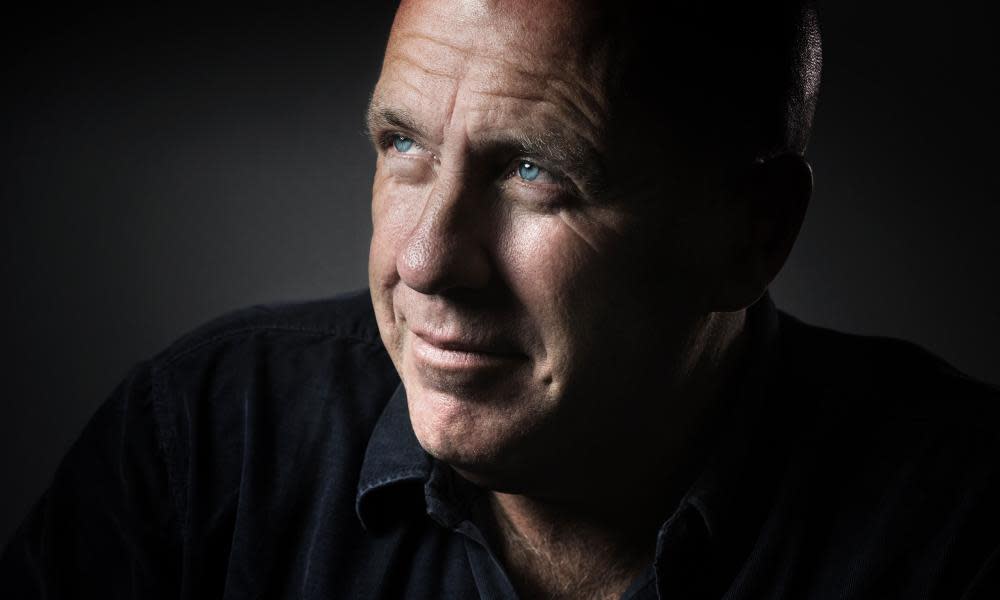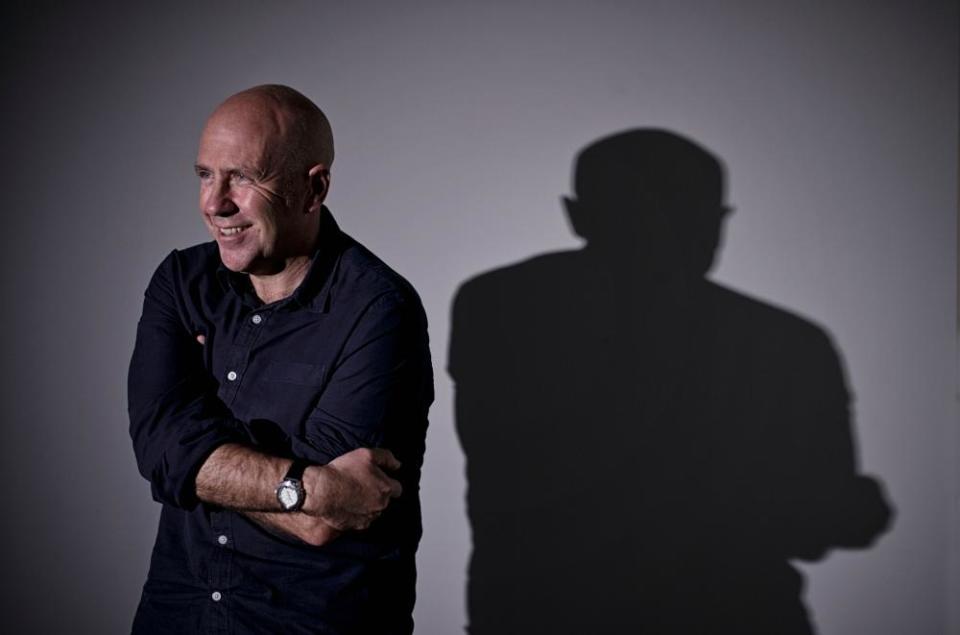Richard Flanagan: 'Despair is always rational, but hope is human'

About half an hour into our conversation, I ask Richard Flanagan what gives him hope. There’s a pause down the phone line, the hiss of empty, mechanical air. Gaps and silences are not unusual in a phone call with Australia’s most recent Booker Prize winner. Not because he’s lost for words – that’s not his style – but because Flanagan is a deeply thoughtful, deeply considered conversationalist. His words are precise, carefully chosen, carrying import and meaning.
To be clear, his magnificent new book The Living Sea of Waking Dreams is hopeful. It is bleak at times, a book about a disappearing world, about loss and grief, about familial failures of empathy and societal failures of attention. But it is also playful; with an eye for absurdity and a darkly funny streak. It is a novel that unmistakably has been written against the backdrop of Australia’s rapidly dying, rapidly vanishing, rapidly degraded natural world. And yet it is, at its heart, hopeful. It’s quite the trick.
Flanagan is at home in Hobart, Tasmania, where the only thing observing social distancing, he says, are the bottles of hand sanitiser sitting neglected on the end of bars. A planned multi-city tour to launch the new book has been shelved, replaced by a recorded interview that will be beamed out to his readers everywhere. He is amused and delighted by the reports about how well the book world is weathering the global pandemic: “Maybe that’s why books are doing well in Covid – nobody has to meet the writers.”
In spite of everything, I find the world very beautiful
Richard Flanagan, author
He is as expansive and enjoyable a conversationalist as ever. The pace is leisurely, the range of subjects capacious. He is his customary beguiling mix of self-effacement and strongly held passion on big topics; funny and generous and curious. But the big topics that are consuming him at the moment are, perhaps inevitably, pretty grim. The world is, by and large, going to shit, and it’s doing it quickly. But hope is important to him. “I didn’t want the book to be despairing. It’s written at a despairing time but I don’t feel despairing. Despair is always rational, but hope is human. Perhaps it’s the essence of being human.
“In spite of everything, I find the world very beautiful. I feel a sense of grateful wonder – just to feel wind on your face, to feel the seasons roll by, the company of friends – as I get older I become more astonished by these things. I find it beautiful and I find in the truth of that beauty a form of hope.”
Related: The Labyrinth by Amanda Lohrey review – a meditative and sprawling novel to lose yourself in
That idea – about beauty and gratitude, about appreciation in the face of a disappearing world – lies at the heart of The Living Sea of Waking Dreams, and accounts for its seemingly contradictory impulses. The book tells the story of Anna, a successful architect whose structured life is broken apart by the medical decline of her ageing mother. With her two brothers – anxious, stammering, kind-hearted Tommy and brutally efficient, decisive Terzo – she’s trying to make sense of how to care for a loved one whose final days have arrived. Because their mother Francie is ready to die. She is sick, she is tired, and she’s ready to kiss her children and bid farewell. If only disappearing were so easy.
It’s clear that for Flanagan this is a book with several inspirations. It started with family. It started with climate emergency and bushfires. It started with the poetry and life of John Clare. With an idea for a fable about the invisibility of middle-aged women. With the voracious and isolating appetites of the news cycle and social media. It is about all of these things and more, and to hear him discuss it is to get a sense of what he means when he refers to it as a book that came to him as a sort of “rising scream”.
“I just became conscious in the past seven or eight years of the way the world is vanishing. Everything I know is vanishing: plants, animals, bird, fishes. Maybe it’s living in Tasmania where there are specific species that you’re aware of. Just 100 yards from here are some of the last 500 swift parrots. A few bays from around here was where the last red handfish was found, the first fish species in modern times to be declared extinct. You’re just very conscious that things you thought were here forever are now in their autumn. It’s over.
‘“And I think most people have a sense of this, but when you point to it they just point to their phones; they point to something there because it’s as much as they can deal with. It’s as much as any of us can deal with. So they live through a world reified back to them through a small screen and its madnesses.”

That feels like a comprehensive summary of his novel’s concerns, but moments later he presents another equally compelling explanation: “The catalyst for this book came from one of my daughters and a story she told me from her workplace. She works in a hospital, and there was an old man who had been admitted, who was dying and ready to die. But his family were wealthy and privileged and powerful. And they wouldn’t allow it. And somehow it offended them. She didn’t know why, but it clearly offended them.
“So they determined that he would not die. And they brought all their power and privilege to bear to make sure that in spite of the medical advice, in spite of their father’s wishes, he wouldn’t die. Which also meant he couldn’t live. He just went into this sort of dreadful indeterminate world, where he was neither living nor dying.”
Both urgent, consuming ideas, both equally present in the book, both just the smallest part of the whirling magical realities of the book. “This is the problem with doing interviews,” Flanagan laughs. “It’s presumed that the author starts with an intention and if the book’s published they’ve succeeded in it. But successful books are ones that have escaped the author’s intentions and become something else. Novels when they succeed are incoherent and contradictory and mysterious. Nothing is more secondary to a writer’s achievements than their original ambition.”
Again, that thoughtfulness, that deliberateness that characterises Flanagan – as a thinker, as a talker, as a writer – is at play. He’s equally animated outlining the architecture of this book as its grand themes, as drawn to the questions of voice, of a level of structural play that brings to mind Gould’s Book of Fish as he is about big ideas of life and death.
On balancing the novel’s magical and realist tendencies, he recalls the passage in One Hundred Years of Solitude where Father Reyna levitates with a half-drunk cup of cocoa in his hand. “I think about that cocoa. You could practically taste it. In that detail Marquez buys your belief in the levitation.” In reflecting on when the book clicked into place he is emphatic about the importance of the voice: “Once you have voice you have everything.” In accounting for why he created the family in the book – so unlike his own large, clannish, close family – he shares that he wanted to explore a family made distant from one another by trauma.
Related: I used to shrug off the beauty of New Zealand. Then I drove from the top to the bottom
He borrowed much of his own mother’s earlier life to draw Francie, but there was at least one fundamental difference between the two women: “I never realised until I watched my mother die that you can die well. It may sound strange, but it was one of the most effecting and beautiful things I’ve seen in my whole life. When she died, she was surrounded: she gave her life to other people and at the end she was in this little room and there were always like 40 or 50 people in the room and the corridor. She died over three days. She was 95. And people would come in one by one. You had to get very close to her at the end because she was talking so softly, she had so little left, but to each one she’d say something apposite and beautiful. And then to the next person. And the next. But her final words were “thank you all for coming. I’ve had a lovely time”. Flanagan laughs as he recalls this, a gentle laugh full of love and grace.
When I hang up the phone, I sit for a while in the quiet of my locked-down house in Melbourne. The pandemic and the measures being taken here to keep it at bay have had a strange distorting effect on time and perspective. The world outside feels a long way away in this weightless half-life. The modern condition – simultaneous connection and isolation through our devices – feels particularly acute. Flanagan hasn’t just written about the space between living and dying; in writing about the things that are disappearing from the world he’s captured something fundamental about the moment we’re living in.
The novel was written more or less in real time over last summer, as the Australian mainland was gripped by rolling bushfires and smoke, the first of the apocalyptic turns 2020 has taken. “The challenge that took me years to work out was how to write about the collapsing of the natural world,” Flanagan said. “This awareness of a moment of immense loss that could take us with it. I wanted to write it with a kindness and a gentleness because it seemed to me that above all things it was human dignity that was being attacked. That’s what I was searching for. Trying to find my way towards a new language of both grief and possibility.”
The Living Sea of Waking Dreams by Richard Flanagan is available through Penguin Random House now

